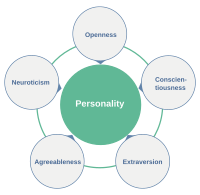
Photo from wikipedia
BackgroundWorldwide, many undergraduate general practice curricula include community-based courses at general practitioners’ (GPs’) offices. Usually the academic general practice departments collaborate with networks of affiliated teaching practices. To successfully master… Click to show full abstract
BackgroundWorldwide, many undergraduate general practice curricula include community-based courses at general practitioners’ (GPs’) offices. Usually the academic general practice departments collaborate with networks of affiliated teaching practices. To successfully master the challenge of network development and extension, more information is needed about GPs’ willingness to be involved in different teaching formats, important influencing factors, incentives, barriers, and the need for financial compensation.MethodsIn this cross-sectional study a questionnaire survey was conducted among all GPs working in Leipzig and environs (German postal code area 04). In addition to descriptive statistics, group comparisons and logistic regression were performed to reveal differences between GPs with and without an interest in teaching.ResultsResponse rate was 45.3% with 339 analyzable questionnaires. The average age was 52.0 years and 58.4% were women. Sixty-two participants stated that they were already involved in teaching undergraduates. Altogether 60.1% of all GPs and 53.5% among those who didn’t teach yet were basically interested in being involved in undergraduate education. The interested GPs could imagine devoting on average 6.9 h per month to teaching activities. GPs interested in teaching were on average younger, were more actively involved in continuing education and professional associations, and more frequently had pre-existing teaching experiences. The willingness to teach differed substantially among teaching formats. GPs were more willing to teach at their own practices rather than at university venues and they preferred skills-oriented content. Comprehensive organization on the part of the university including long-term scheduling and available teaching materials was rated as most important to increase the attractiveness of teaching. Time restraints and decreased productivity were rated as the most important barriers. Interested GPs appreciated financial compensation, particularly for teaching at university venues, and demanded amounts of money corresponding to German GPs’ hourly income.ConclusionsThe GPs’ interest in undergraduate teaching is generally high indicating a substantial pool of potential preceptors. Recruitment strategies should consider the collaboration with institutions involved in residency and continuing education as well as with professional associations. Comprehensive organization by the responsible department should be promoted and time restraints and decreased productivity should be overtly addressed and financially compensated.
Journal Title: BMC Medical Education
Year Published: 2019
Link to full text (if available)
Share on Social Media: Sign Up to like & get
recommendations!